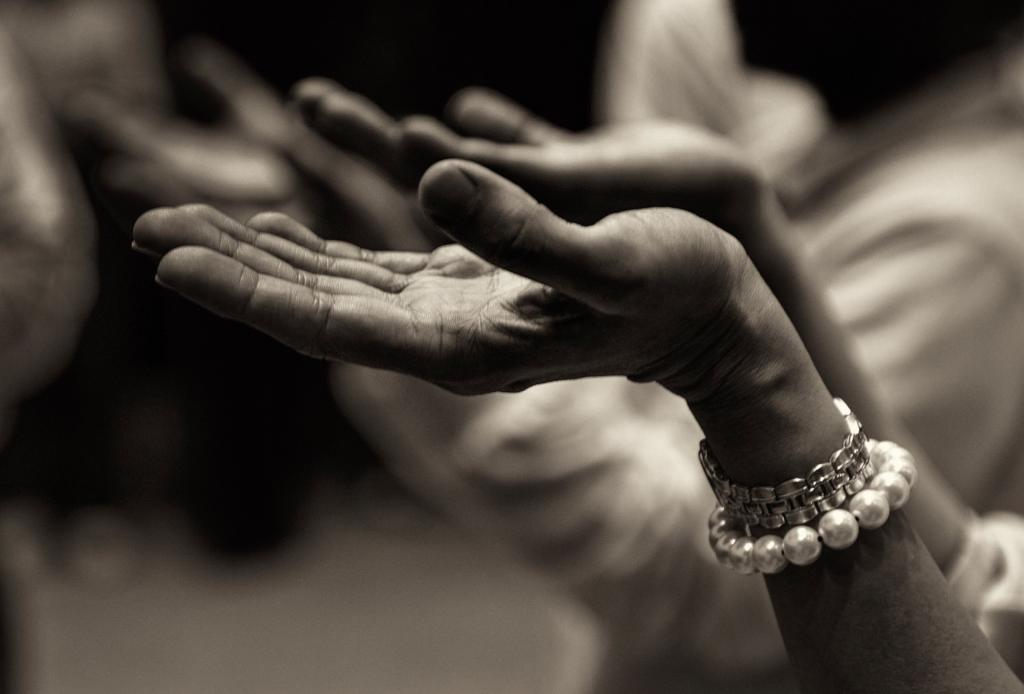 I’ve never liked the phrase “the power of prayer.” Too many times people toss it out like a talisman, a lucky charm, as if to say that enough people praying will make something happen. No, that’s not how it works. The power of prayer lies in the One to whom we pray. God makes things happen, sometimes because we pray but always because it’s his will. The act of praying isn’t powerful in itself.
I’ve never liked the phrase “the power of prayer.” Too many times people toss it out like a talisman, a lucky charm, as if to say that enough people praying will make something happen. No, that’s not how it works. The power of prayer lies in the One to whom we pray. God makes things happen, sometimes because we pray but always because it’s his will. The act of praying isn’t powerful in itself.
I still believe that. If a person doesn’t direct her words to Almighty God, she merely mutters or vents or wails in vain. And when the words of a faithful person do bend the ear of our Father, he then chooses how he will respond. So my plea may or may not be answered the way I want.
But I just sent two of my sons overseas on a mission trip. One of my best friends walks the lonely path of the newly divorced. Another friend watches her newborn son fight for his life in NICU. And I’m starting to reconsider my dislike of the phrase, “the power of prayer.” Let me explain.
Prayer is Biblical
The Bible clearly affirms the importance of prayer. We see in every book that God encourages his people to pray to him. People naturally turn to God in their grief (Ps. 39:12), suffering (102:1), times of need (55:1), requests for forgiveness and guidance (Neh. 1:5–11). Some psalms can be repeated word-for-word if we can’t find our own to pray. God welcomes the prayer of a righteous person (Prov. 15:8, 29), and such a prayer is effective (Jas. 5:13–16). Jesus himself taught his followers how to pray (Matt. 6:9–13) and would seclude himself for extended times of prayer to his Father (Luke 6:12).
God wants us to pray to him, to communicate our hearts, needs, emotions, desires, sufferings, laments, joys . . . prayer enables us to share our very selves with our creator. Closely tied to the idea of prayer is faith—the writer of Hebrews reminds us that without faith no one can please God (10:38). If we trust that he is the all-powerful, all-loving creator God, we can lay our requests before him with confidence.
But sometimes we get divorced, or our child’s life is threatened, or we send loved ones into spiritual warfare on a tin can high in the air for 1,300 miles—situations in which our prayers can seem useless, weak, ineffective, or hopeless. We aren’t sure we can believe.
Here’s my theory: When we are most emotionally charged and intimately bound to a situation needing God’s help, we often flounder. We’re just too close. It can make our hearts skip a beat, keep us up through the night, bring paralyzing doubts to our minds. Often we can’t find the words to pray. Sometimes we pray but don’t truly believe that rescue will come. We are too busy just surviving.
I’m reminded of the story from Mark 9:17–24, in which a man brought his demon-possessed son to Jesus.
“Teacher, I brought my son to you. He has a spirit that makes him unable to speak. Whenever it seizes him, it throws him down, and he foams at the mouth, grinds his teeth, and becomes rigid. I asked your disciples to drive it out, but they couldn’t.”
He replied to them, “You unbelieving generation, how long will I be with you? How long must I put up with you? Bring him to me.”
So they brought the boy to him. When the spirit saw him, it immediately threw the boy into convulsions. He fell to the ground and rolled around, foaming at the mouth. “How long has this been happening to him?” Jesus asked his father. “From childhood,” he said. “And many times it has thrown him into fire or water to destroy him. But if you can do anything, have compassion on us and help us.”
Jesus said to him, “‘If you can’? Everything is possible for the one who believes.” Immediately the father of the boy cried out, “I do believe; help my unbelief!”
I am that father. When I love so deeply, so desperately, my emotions skew my perspective, and my faith has wavered. “I do believe; help my unbelief!” In the middle of a struggle for myself or those dearest to me, I have sometimes wondered if and how things would work out. When will it be resolved? Will they ever stop hurting? How could this possibly work out for good? And yet, I know that God is compassionate, gracious, and all-powerful.












